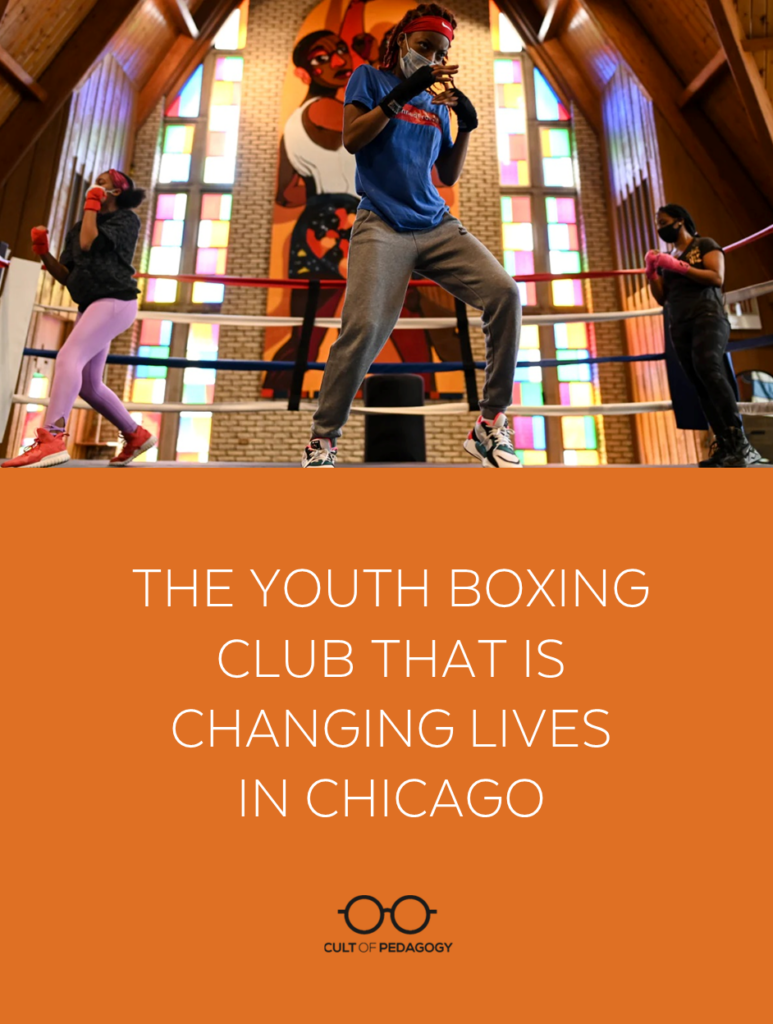
Listen to the interview with Jamyle Cannon (transcript):
Sponsored by EVERFI and Giant Steps
I remember listening to a conversation once between two men I taught middle school with. Some of the details are fuzzy now, but here’s the gist of it: Both were classroom teachers and both were coaches of our school’s football team. Midterm grade reports had just come out, and they were talking about one kid, a player on the team, who was failing one of his classes. According to the team’s policies, the student was supposed to face disciplinary action for this grade, something that amounted to being removed from the team temporarily, with the threat of permanent removal if the grade was not brought up.
Both teachers were clearly struggling with the situation. One of them said to me, “If we’re gonna have a policy like this, we have to enforce it or it means nothing. But if he loses football, ALL of his grades are going to go down. It’s the only thing keeping him on track.”
I still don’t remember what they decided to do. Part of me thinks they made an exception — either negotiating with the teacher in question to arrange enough make-up work or extra credit to raise the grade, or just looking the other way for this one student, one time. But the conversation, the conflict these teachers were having, illustrates a much larger problem: In most schools, extracurriculars are used as a carrot to get students to perform academically and behaviorally. The assumption is that all students need is the right motivation, something they love enough to make them want to do well in school; if they choose not to do well, they lose the thing they love. I think most people who work within this system hope that they never have to actually enforce these policies, that they will work as intended and get students to do what they need to do.
But when they don’t work, then what? What happens to the kids who are turned away from extracurriculars, away from the very activities that would help them thrive?
This is the question a young Chicago teacher named Jamyle Cannon asked himself about a decade ago. When he started a basketball team at his school and had to turn away dozens of students for their grades and behavior, he immediately saw a flaw in the way extracurriculars are usually run. When programs like these turn kids away, they cut them off from the relationships, support, structure, and mentoring those activities usually offer, factors that are often essential for achievement in school.
This realization prompted him to try again with a different approach: He started a club where kids could come and learn the fundamentals of boxing, a sport Cannon himself had been very successful in, and this time he didn’t turn students away. By the end of that first year, even though he hadn’t implemented any kind of grade policy, the grades of all students in the club had gone up.
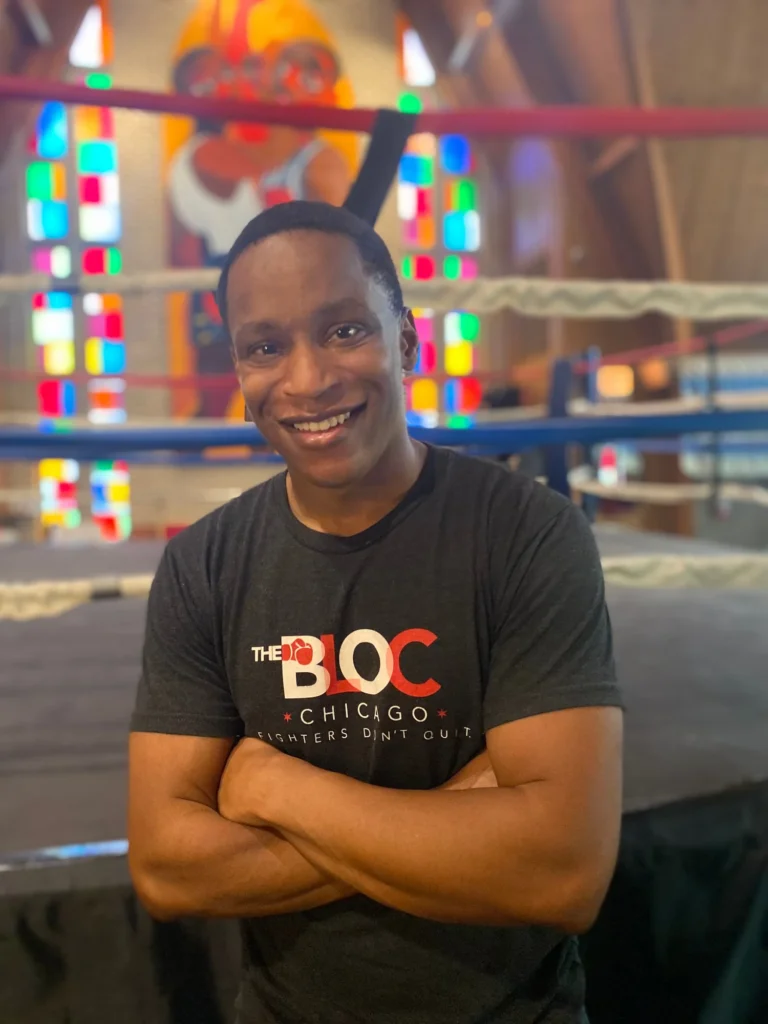
Cannon’s little boxing club has now grown into a full-blown nonprofit that currently serves hundreds of students on Chicago’s West Side. While the core activity of this after-school program is boxing, it offers so much more to students, like academic support, mentoring, field trips, facilities and technology for learning, even a food pantry. Students in the program, who attend schools in the surrounding neighborhoods, have a 100% graduation rate and an average GPA of 3.2.
The name of the program is The Bloc. It is my hope that the story of Jamyle Cannon and The Bloc will offer a model for other educators, a different path forward in the way we look at extracurriculars.
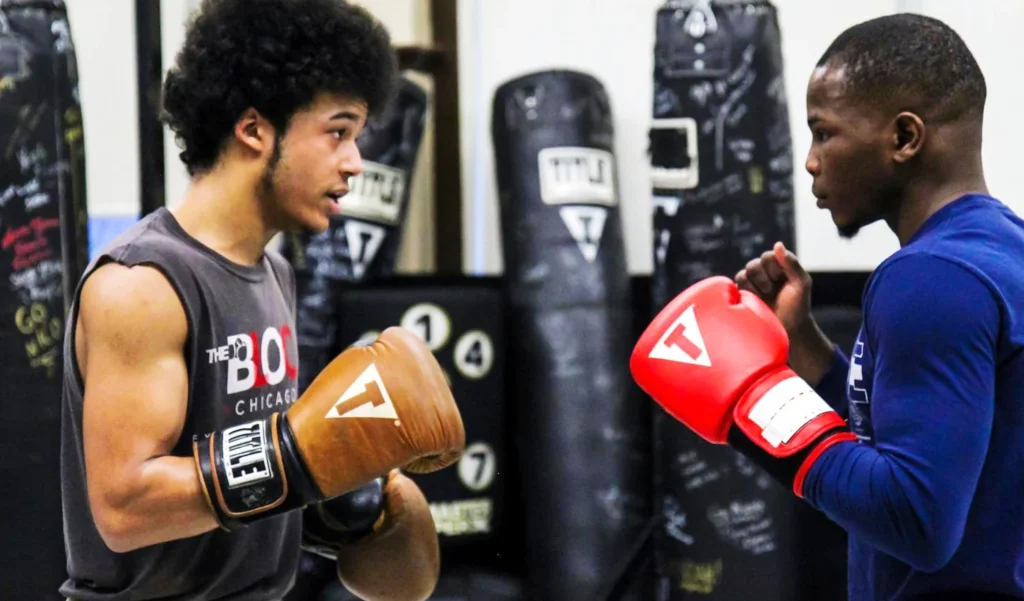
An Overview of the Program
The Bloc is a free after-school youth program housed in a restored church on the West Side of Chicago. In 10-week sessions, students participate in boxing training, but they also do their homework, get academic help, and participate in other activities provided by the program, like a food pantry that distributes fresh produce, canned goods, and other items to the surrounding neighborhood, and enrichment programs that bring in experts to teach skills like cooking, coding, and screen printing, all based on students’ interests.
This practice of following students’ lead is key to the success of the program. Not doing this is why Cannon thinks other programs with the same goals often fail.
“So many times,” he says, “we plan activities and programs around what we think, what adults think kids should be doing, when in reality, kids are telling us what they want to do all the time. If you’re a kid on Chicago’s West Side, and I ask you to join a mentoring and tutoring program, your answer is probably going to be no. But if I ask you to join a boxing program, you’re much more likely to say yes, and then we get an opportunity to create a relationship with you that’s going to provide so many resources and opportunities in your lives.”
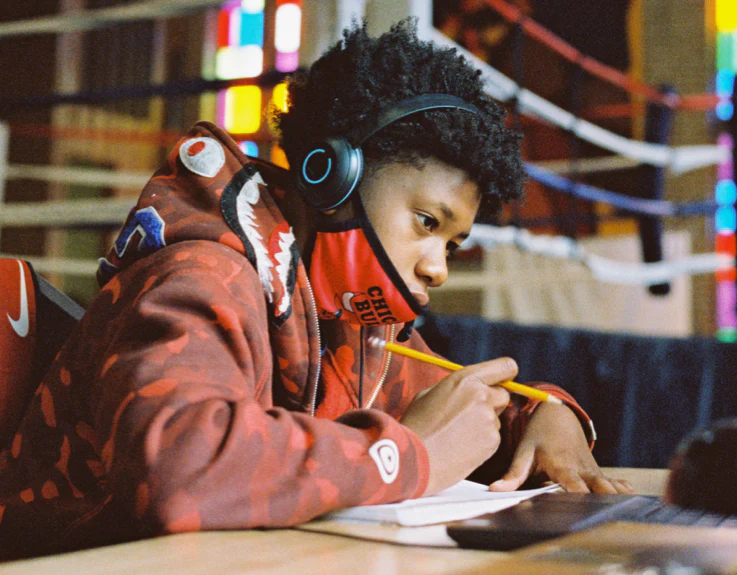
Academic and Behavioral Supports
So what about academics? What about behavior? We started this article describing the problem of programs excluding students who don’t meet certain minimum standards for both of these, so what does The Bloc do differently? What happens if a student’s grades drop or they get into some trouble? In both cases, the answer is support.
On the academic front, the idea is to catch problems before they get too serious to fix.
“We have young people who are getting check-ins at least every other week,” Cannon explains. “Some of them if they’re in an emergency level of assessment, they’re going to check in every week. With grades, there’s an academic repair plan. So it starts with the student going to the school with a sheet that says, these are the things that I’m missing or I didn’t do well on, and asking their teachers if they can get make-up work on those things. They then bring that to The Bloc and before boxing training every day, that’s what they’re doing for the first 45 minutes with the support of staff and volunteers.”
If more support is needed, the Bloc staff reaches out to parents and teachers to learn more about what they can do to support the student, which may also include bringing in outside help for subject-specific tutoring.
Ultimately, self-sufficiency is the goal. “We try to put as much of it onto the fighter as possible,” Cannon says. “There’s a lot of good that’s coming from putting it into their hands so that they can go and find the things that they need.”
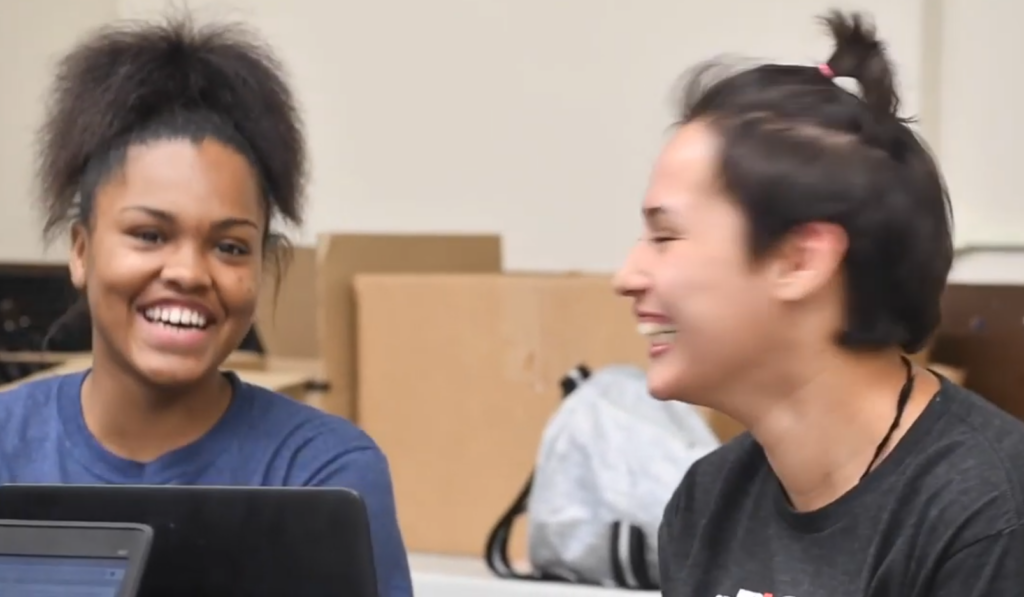
As for behavior, The Bloc takes a restorative approach, with a big focus on personal accountability, working with students to determine who was harmed by their actions and taking steps to repair the harm. “I think a lot of people hear about restorative approaches, and they don’t realize that it’s actually one of the highest forms of accountability that you can have,” Cannon says. “We can punish you and say, you go away for two weeks, and then you come back, and you’ve done nothing to fix the situation that you got into to begin with. With a restorative approach, you often have to look in the eye of the person that you’ve harmed and hear about it, and then acknowledge it, and then do something to fix it. There’s much more accountability in that process.”
Is there any situation that might cause a student to be removed from the program?
“The point where we would say, ‘Sorry, you’re out’ is if you’re refusing to take accountability for anything that’s taken place,” Cannon says. “We can’t even enter a process to make whatever is happening right then. We’re not the people to help you. We can help you find the people who can, who can be of import in your life. But the most important thing is we always take accountability.”
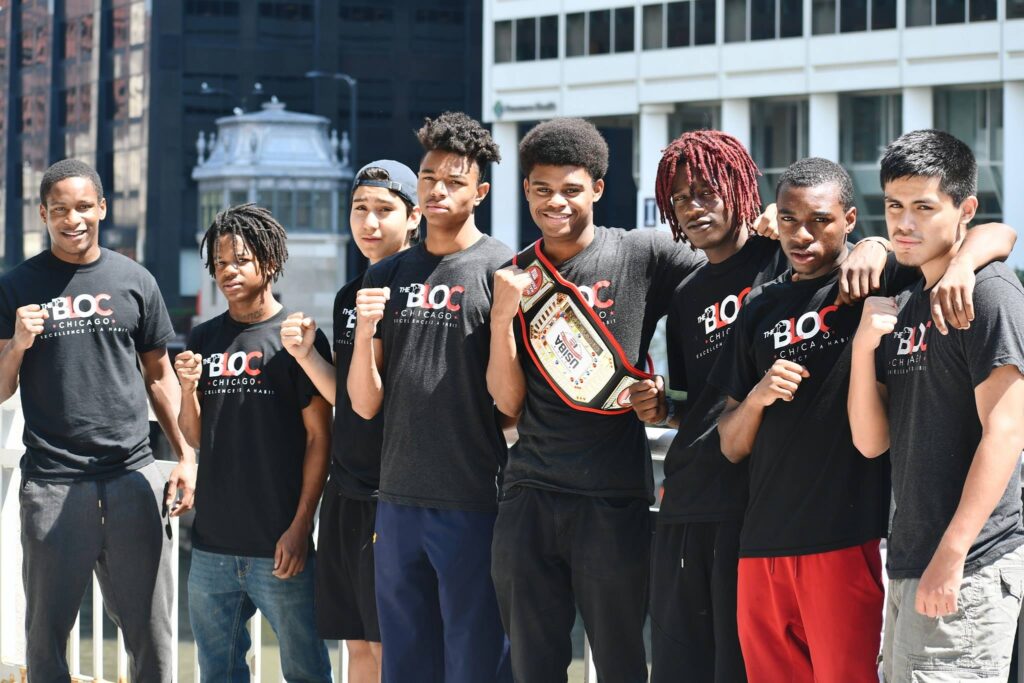
Funding the Program
The Bloc offers students exceptional support, opportunities, and resources. Cannon makes an effort to not cut corners.
“We try to get the absolute best of everything,” he says. “We don’t just want to be good enough. You know, I came up in a lot of spaces that were just good enough for, you know, Black and brown kids. And good enough actually is almost never good enough. So we try to get the best of what we can, the best equipment, the best educational supplies, the best facility, and they take care of it because I think they know that they are valued.”
All of that costs money, and as a nonprofit, The Bloc is supported by donations and grants. That requires fundraising, an effort that has evolved along with the organization, starting at the grassroots, word-of-mouth level.
“When we were first starting off,” Cannon recalls, “I wasn’t running big, elaborate fundraising campaigns. I was saying, like, hey, you come in here and see what we’re doing, work out with some kids, help a kid with their homework, give if you can, bring somebody back with you. So the programming and the fundraising ran hand in hand.”
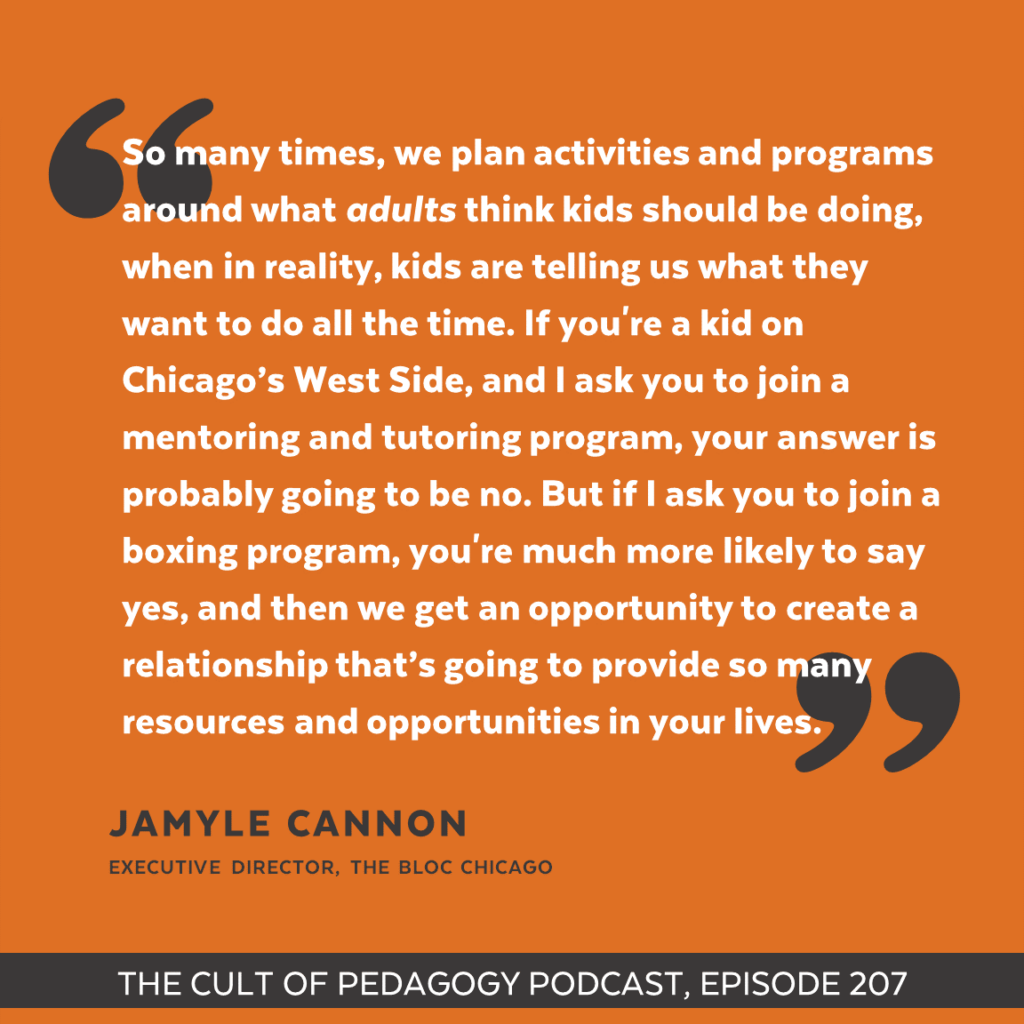
While fundraising is now coordinated under a director of development, the focus is still on sharing what the organization does and building personal connections.
“If I show you all what we’re doing,” Cannon says, “then you’re going to want to support it. If I show you that we just took a bunch of kids on this college trip, that we’re taking kids out to dinner, that we’re experimenting with how to bring our heart rates down faster, if I show you all these little things that we’re doing on our day-to-day, you’re going to want to jump in and support us. So to me, fundraising should be a more organic process and built on the relationships that you have with people.”
Can You Envision This in Your Neighborhood?
If learning about The Bloc gets you thinking about how to make something like this happen in your community, Cannon has some advice.
- Listen to students. For a program like this to work, Cannon says, it has to be built around an activity students are actually excited about. “If kids are doing something that they love, then they’re going to have great results, whatever that means for them.”
- Do what you know. Cannon discourages anyone from attempting to start a boxing program per se, unless, of course, they really know boxing. “You do the thing that you are great at,” he says, “and if you have a passion for it, you’re going to find other people who have a passion for it. See where your strengths align with the young people that you’re in contact with. Listen to what it is that they want and, and use that as your guide to help support them.”
- Find partners. So much of The Bloc’s success has come from partnerships with others. This means those who can give financial support, but also those who give their time and expertise, like subject-area tutors, people who teach enrichment courses, and those who volunteer to work in the garden and food pantry. “We’re going to get stronger by working with people and organizations that can bring in resources that are going to benefit the entire community, not just kids who want to fight.”
I first discovered Jamyle Cannon through his fantastic TikTok channel, where he shares stories and insights about helping kids thrive, along with smart advice for leaders in the nonprofit sector.
Join our mailing list and get weekly tips, tools, and inspiration that will make your teaching more effective and fun. You’ll get access to our members-only library of free downloads, including 20 Ways to Cut Your Grading Time in Half, the e-booklet that has helped thousands of teachers save time on grading. Over 50,000 teachers have already joined—come on in.



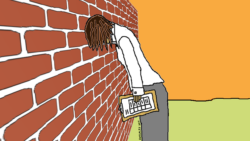

Love this!! Also check out the Downtown Boxing Gym in Detroit if interested in taking a look at other similar programs. https://dbgdetroit.org/about-us/#faqs
Today’s podcast on the value of boxing (and all other extracurricular activities ) was a home run. I wrote in Ed Leadership about “The Extracurricular Advantage” and found, as you suggested, that we take the students who most benefit from extracurricular activities out of those opportunities when their grades fall. Coaches recruit the 3-letter athlete and club advisors go after the 3-club president. We need to go after the disengaged student and, when grades fall, our reaction should be “welcome to the drama club!” or athletic team or chorus or boxing club. Thanks for this really important podcast.
I hope that stories like these inspire more educators to explore innovative approaches to extracurricular programs. The Bloc’s model not only creates a space for physical activity but also addresses the broader needs of students, ensuring they have the tools and support necessary to thrive academically and personally.